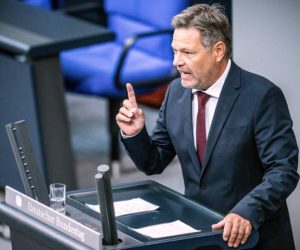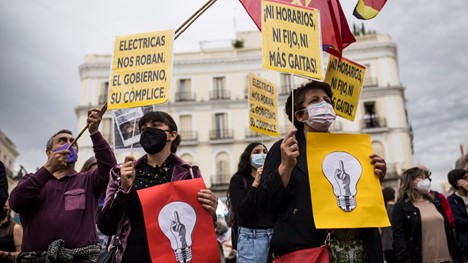Germany is facing a significant energy crisis this winter, prompting the government to implement a series of emergency measures to address the situation. One of the primary steps taken is the introduction of winter fuel subsidies for households. These subsidies are designed to alleviate the financial burden on families struggling with soaring energy costs. By
Germany is facing a significant energy crisis this winter, prompting the government to implement a series of emergency measures to address the situation. One of the primary steps taken is the introduction of winter fuel subsidies for households. These subsidies are designed to alleviate the financial burden on families struggling with soaring energy costs. By providing direct financial assistance, the government aims to ensure that households can afford to keep their homes warm during the harsh winter months. This measure is particularly crucial for low-income families and vulnerable populations who are most at risk of energy poverty.
In addition to providing financial support, the government has also mandated reduced energy consumption across the country. This directive is part of a broader strategy to manage the limited energy resources more effectively and prevent potential shortages. Citizens are encouraged to adopt energy-saving practices, such as lowering thermostat settings, using energy-efficient lighting, and reducing unnecessary electricity usage. Public buildings and offices are also required to implement energy-saving measures, such as limiting heating and lighting during non-essential hours. These combined efforts are expected to contribute significantly to reducing overall energy consumption and ensuring a more stable energy supply throughout the winter.
Energy conservation strategies

Image by : Yandex
To further combat the energy crisis, Germany has implemented stricter energy regulations. These regulations are aimed at curbing excessive energy use and promoting more sustainable consumption patterns. For instance, new building codes now require higher standards of insulation and energy efficiency, ensuring that new constructions are better equipped to retain heat and reduce energy wastage. Additionally, businesses are being encouraged to conduct energy audits and adopt more efficient practices in their operations. These measures are not only expected to reduce energy demand but also to foster a culture of conservation and sustainability among the population.
Another key strategy is the promotion of energy-efficient appliances. The government is actively encouraging households and businesses to invest in appliances that consume less energy. This includes offering incentives and rebates for the purchase of energy-efficient products, such as refrigerators, washing machines, and heating systems. By making it more affordable for consumers to upgrade to these appliances, the government hopes to significantly reduce the overall energy consumption. Public awareness campaigns are also being conducted to educate people about the benefits of energy-efficient appliances and how they can contribute to mitigating the energy crisis.
Impact on households
The energy crisis has led to increased heating costs for households, which is a major concern for many families. With energy prices continuing to rise, households are facing higher bills just to maintain a comfortable living environment. This financial strain is particularly challenging during the winter months when heating is essential. Many families are being forced to make difficult choices, such as cutting back on other expenses to afford their energy bills. The government’s winter fuel subsidies aim to ease this burden, but the overall impact on household budgets remains significant.
There is also the potential for energy rationing, which could further affect household comfort. In extreme cases, if energy supplies become critically low, the government may have to implement rationing measures to ensure that essential services and vulnerable populations receive priority. This could mean that households experience scheduled power cuts or limited heating periods. Such measures, while necessary to manage the crisis, would undoubtedly disrupt daily life and add to the stress and discomfort experienced by many families. The government is working to avoid this scenario, but it remains a possibility if the energy situation does not improve.
Role of renewable energy

Image by : Yandex
Renewable energy sources have the potential to mitigate the impacts of the energy crisis. By increasing the share of renewable energy in the national grid, Germany can reduce its dependence on fossil fuels and enhance energy security. Investments in wind, solar, and biomass energy are already contributing to a more diversified energy mix. These renewable sources are not only environmentally friendly but also provide a more stable and predictable supply of energy. Expanding renewable energy capacity is a key part of the government’s long-term strategy to address the current crisis and prevent future energy shortages.
The energy crisis has highlighted the urgent need for greater investment in renewable energy. The limitations of relying on traditional energy sources have become apparent, and there is a growing consensus that a more sustainable approach is necessary. Increased funding for renewable energy projects, research, and development is essential to accelerate the transition to a greener energy system. By prioritizing renewable energy, Germany can build a more resilient and sustainable energy infrastructure that is better equipped to handle future challenges.
International energy cooperation

Image by : Yandex
The energy crisis has underscored the need for international energy cooperation. Germany cannot address the crisis in isolation; it requires collaboration with other countries to ensure a stable and secure energy supply. Joint efforts in energy procurement, sharing of resources, and coordinated responses to supply disruptions are crucial. By working together, countries can pool their resources and expertise to mitigate the impacts of the crisis and support each other in times of need. International cooperation is also essential for developing and implementing innovative solutions to enhance energy security.
Germany is actively engaging in joint winter plans for energy security with its neighbors and other international partners. These plans involve coordinated actions to manage energy supplies, share best practices, and support each other in times of crisis. For example, Germany is working with other European countries to ensure that energy flows across borders are optimized and that any surplus energy can be directed to areas in need. Such collaborative efforts are vital for maintaining energy stability and preventing shortages during the winter months. By fostering strong international partnerships, Germany aims to enhance its energy resilience and contribute to a more secure and sustainable global energy system.
Economic implications
The rising energy costs are having a significant impact on Germany’s economic stability. Higher energy prices are increasing production costs for businesses, which in turn can lead to higher prices for goods and services. This inflationary pressure is affecting both consumers and businesses, potentially slowing down economic growth. The increased costs are also putting a strain on household budgets, reducing disposable income and consumer spending. These economic challenges are compounded by the uncertainty surrounding energy supplies, which can undermine business confidence and investment.
The energy crisis also threatens industrial productivity and growth. Many industries rely heavily on energy for their operations, and rising costs can erode profit margins and competitiveness. Energy-intensive sectors, such as manufacturing and chemical production, are particularly vulnerable. If energy shortages or rationing measures are implemented, it could lead to production slowdowns or even temporary shutdowns, further impacting economic output. The government is working to mitigate these risks by supporting businesses and promoting energy efficiency, but the overall economic implications of the energy crisis remain a significant concern for Germany’s future growth and stability.
















